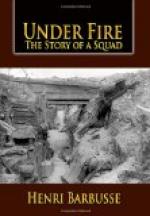Volpatte was shivering, and his little strapped-up eyes burned with fever in the enormous dump of rags set upon his shoulders. “That’s good,” he says, drinking.
“Ah! And then, too,” he added, emptying—as politeness requires—the drop of wine that remained at the bottom of Farfadet’s cup, “we got two Boches. They were crawling about outside, and fell into our holes, as blindly as moles into a spring snare, those chaps did. We tied ’em up. And see us then—after firing for thirty-six hours, we’d no more ammunition. So we filled our magazines with the last, and waited, in front of the parcels of Boche. The liaison chap forgot to tell his people that we were there. You, the 6th, forgot to ask for us; the 18th forgot us, too; and as we weren’t in a listening-post where you’re relieved as regular as if at H.Q., I could almost see us staying there till the regiment came back. In the long run, it was the loafers of the 204th, come to skulk about looking for fuses, that mentioned us. So then we got the order to fall back—immediately, they said. That ‘immediately’ was a good joke, and we got into harness at once. We untied the legs of the Boches, led them off and handed them over to the 204th, and here we are.”
“We even fished out, in passing, a sergeant who was piled up in a hole and didn’t dare come out, seeing he was shell-shocked. We slanged him, and that set him up a bit, and he thanked us. Sergeant Sacerdote he called himself.”
“But your wound, old chap?”
“It’s my ears. Two shells, a little one and a big one, my lad—went off while you’re saying it. My head came between the two bursts, as you might say, but only just; a very close shave, and my lugs got it.”
“You should have seen him,” says Fouillade, “it was disgusting, those two ears hanging down. We had two packets of bandages, and the stretcher-men fired us one in. That makes three packets he’s got rolled round his nut.”
“Give us your traps, we’re going back.”
Farfadet and I divide Volpatte’s equipment between us. Fouillade, sullen with thirst and racked by stiff joints, growls, and insists obstinately on keeping his weapons and bundles.
We stroll back, finding diversion—as always—in walking without ranks. It is so uncommon that one finds it surprising and profitable. So it is a breach of liberty which soon enlivens all four of us. We are in the country as though for the pleasure of it.
“We are pedestrians!” says Volpatte proudly. When we reach the turning at the top of the hill, he relapses upon rosy visions: “Old man, it’s a good wound, after all. I shall be sent back, no mistake about it.”
His eyes wink and sparkle in the huge white clump that dithers on his shoulders—a clump reddish on each side, where the ears were.
From the depth where the village lies we hear ten o’clock strike. “To hell with the time,” says Volpatte “it doesn’t matter to me any more what time it is.”




